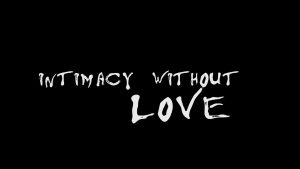On Love, and Dosas
by Treya Agarwal | March 30, 2024

It’s 10am on a Saturday. An unfamiliar crowd trickles in. Strings of couples, each having breakfast at my favourite South Indian restaurant in Bombay, each blissfully lost and painfully comfortable with the other. They share dosas and coffees, aspirations and casual morning slippers. Is there anything more domestic, more intimate than breakfast?
…
I love you. I love you. I love you.
If you say anything enough times, doesn’t it lose all meaning?
…
Love, I find, is not always a palatable emotion. To drag oneself into it, out of it, and right back into it is an incredibly messy affair with so, so much friction. I want to know: why should we do it? There is a temptation, the writer must admit, to feel rankled. Spring mornings and weekends are inevitably, frustratingly, accompanied with sickeningly sentimental duos. What is it about breakfast that makes domesticity so brazen?
Why can’t I enjoy my productive morning with filter coffee without being reminded that some people’s lives actually resemble the plot of About Time – domestic bliss, and beautiful scores and all. Why do the opening bars of Slow Dancing In A Burning Room have to imbue the scene with such forceful melancholy and sentiment?
My resentment is of course, on the one hand, childish. But on the other hand, it is a wildly held and seemingly rational position. Groaning at the heteronormativity of it all, pointing to divorce rates, to the fact that “marriage is an economic proposition” (Greta Gerwig, Little Women 2019), is all too familiar in modern culture. I am, and have been, for many years, fond of a decidedly pragmatic and statistical approach to love (and would still vehemently defend it). There is a tendency to suggest that needing someone in the way that true, long term monogamy demands is unrealistic. Is unnecessary.
…
My favourite imagined ideal of domesticity, well-thumbed and tended to is a Sunday morning breakfast; ordering filter coffee, dosas and vadas is my platonic ideal of intimacy, of routine, and reliability. (A friend pointed out to me that this is what my parents did every weekend morning; four of us, sleepily, heading to our favourite dosa place each weekend. Surprise, surprise.) There is no room for pretence in breakfast; it’s no makeup, bed-hair, tired and goopy; it has bright lights and can go hideously wrong, without the crutches of alcohol to save it. If you can find love at breakfast, you know you can trust it; no one’s here to pull, no one’s looking for a one-night stand. It’s just you, the dolce vita of a weekend morning, and whoever you choose to share it with.
…
Strong Independent Women don’t need soulmates, though. We only need new-age individualism, aesthetically decorated apartments, and quartets of friends to have bottomless brunch with! To have long, fulfilling, soulful conversations about life’s purpose, about psychoanalysis, to laugh till you hiccup with your friends is enough for us. Screaming praise in the club about the single life and the joys of being unfettered, unencumbered. Viewing relationships as salvation, as somehow superior, more important, deeper is ridiculous.
Right?
…
In Urdu (and Hindi, depending on who you ask), love has many names. Mohabbat. Ishq. Pyaar. Sometimes, it frustrates me that I cannot convey the emotion that accompanies “I love you” in any other way in English (I love you ‘so much’ being a paltry upgrade). Teach me to express my feelings in different ways, teach me to give them the weight I feel. Teach me to not be embarrassed of this weight. Teach me to carry it, to share it.
…
I am aching for someone to tell me that it is okay to drown, tumble, and fall in love. It is not stupid. It is not irrational. It is not going to end with me dashed on the rocks. It is not yet another stupid mistake; not another obstacle in the pole-vault course that is “personal development”. It is not that girl, drunk in the corner of the party, having yet another ‘talk’ with her boyfriend, black smudges under her eyes, tissues in her lap. It is not a fog to climb out of, 2 years later, clutching at scraps, wondering where I was. It is okay. It will be okay. I want to believe it; how can I believe it?
…
Casual phrases in Urdu seem like ridiculous flights of fancy in English. Meri jaan, a familiar term of endearment, translates to ‘my soul’. There is a sense of cosmic importance, of devotion, of worship, that when translated to English seems bland, and a little silly. Calling a Hilary situationship “my soul” would get me laughed down High Street, not least by myself.
Why does everything sound more romantic, more dramatic, more soulful when I speak it in my home tongue? English prompts within me that slightly sneering condescension towards getting ‘swept’ away in love, that calling towards the reality of fluorescent lights and morning afters and disappointments. I have no words in Hindi to express the same disdain, the same cynicism.
…
There is something infinitely attractive about the idea of devoting yourself to love. Of believing in the all-encompassing feeling. Of the drowning and the falling. No more hesitant inching, or mediating, or debating the right decisions. Of running breathlessly, down busy streets, suit flapping in the wind, buoyed by the certainty that you now know who you’re meant to spend your life with.
…
‘Ek din kabhi jo khud ko pukaare
Meri zubaan se tu zara, haaye re
Tujh mein chhupi si jo shayari hai
Tujhko sunaaun main zara, haay re
When, one day, you call yourself the way I do
I’ll tell you the poetry hidden in you.’
…
Have I reached the retrospectively obvious conclusion that being a hopeless romantic is rather nice? Perhaps.
…
“Is it running through the airport kind of love?”
…
Does romantic love need a slight craziness, the slight delusion that, oft-quoted divorce rates aside, realities of the world aside, it’ll be okay? Belief that it might just work out. A leap of faith to trust something? Someone?
…
Maybe there is no point in trying to lead an individual life, and self-sufficiency is a futile exercise. Independence is a myth; we know we need other people, in all their messiness. One can’t really be a structurally whole unit, as much as delusions of ‘self-reliance’ are appealing to modern individualism. Sure, co-dependency deserves all the criticism levelled at it; but is idealizing an artifice of ‘personal space’ and ‘breathing room’ the answer to that?
Other people are all we’ve got. So why not go running headlong towards them?
…
I never understood why people call love hope.
Do you?
…
An eloquent writer once said axiomatically: love is embarrassing. It is embarrassing to feel so hopeful. It is embarrassing to think someone would care about you. It is embarrassing to admit you could do everything for someone else. That you would choose to do so. Because love is asking someone to care about you the way you care about them. It is so, so vulnerable.
Love is a Sunday breakfast spot. It is my outstretched hand. It is our shared dosa. It is thinking: will you stay? and saying: do whatever you want.
…
Maybe this writer should refrain from watching About Time in Hilary.∎
Words by Treya Agarwal. Image credit to Treya Agarwal.




